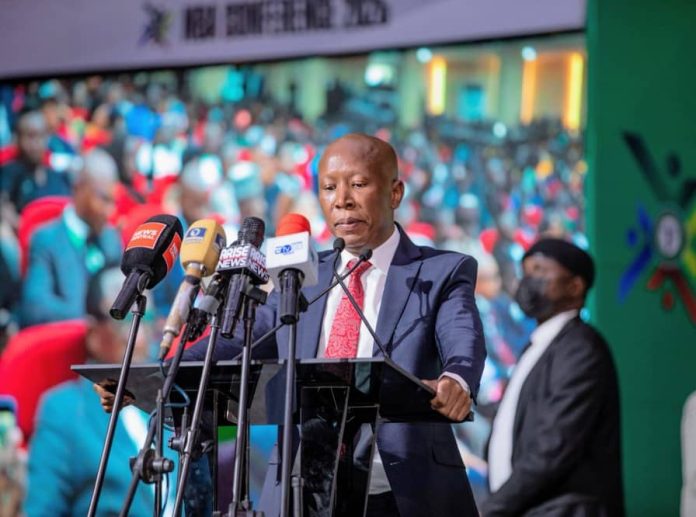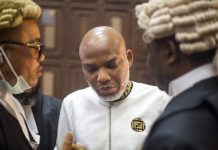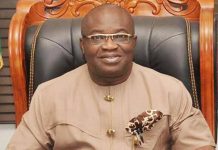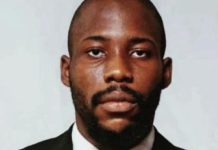Allow me to extend my greetings to the President of the Nigerian Bar Association, President Afam Osigwe, the leadership collective of the Nigerian Bar Association, who have honoured me with an invitation to this esteemed occasion.
I further greet all Members of the Nigerian Bar Association who are present here today, representing the legal fraternity of this great country which remains a friend and ally of South Africa and her people.
I am humbled that you saw it fit to invite me to give an address to the Annual General Conference, and by extension that you saw it necessary to invite the EFF to give this keynote address. I imagine it was not easy for a group of members of the law profession to reach consensus on who will address them, because your profession by nature is one of
robust debate and contestation.
So, I stand here today proud because I know I am a product of robust debate and agreement by people who find it difficult to agree among themselves.
On the Significance of the Legal Profession in Liberation Comrades and Friends, the link between the legal profession and the cause liberation cannot be separated, because just like us you are instruments of justice. While we wage our battle for freedom in the picket lines, through activism, protest and participation in governance – it is you the members of the legal profession who interpret the laws we make, who practice the justice we seek to achieve and who fight tirelessly for those who cannot defend themselves in the courts of law. It is a profession characterised by sacrifice, intellect and a commitment to interpretation of the past in order to achieve justice, fairness and victory in the present and the future.
For the activists, we have history and dialectical materialism to guide us into leading society towards a better tomorrow, and for the legal profession you have indigenous law, common law, case law, the constitution and statutes, and objective reality to achieve not only personal victory but to establish collectively, laws that will govern others for decades to come. Our duty however, and primary responsibility is not to maintain laws simply because they exist as they are today. Our duty is not to be instruments of injustice and neocolonialism, it is to be agents of change and this demands of us to be brave enough to identify unjust laws, speak out and form part of those that work tirelessly for our judiciary to be of service to our people.
I say this not to encourage anarchy and lawlessness, but to draw us back to the difficult truth and reality that at times the law has been used as a weapon of oppression. It has taken lawyers and activists to walk side by side, hand in hand to stand up against laws that perpetuate the undermining of the dignity of the people, and we must all be alive to this history and this possibility today. This becomes even more important for us as Africans, because for centuries our very existence has been unlawful in the eyes of the oppressor, our indigenous laws
have been treated as inferior to Roman Dutch law or the English law.
To be an African has meant that for generations we are not worthy of the laws and rights that make us human beings, and for that reason it was legal to abuse us, to enslave us, to steal our mineral wealth and oil, and to destroy and kill our heritage, history and even our lives
The legal profession you belong to, the political system we belong to, the judiciaries and parliaments we serve were created without us in mind. They were crafted at our exclusion and built to sustain our suffering. We now sit in the corridors which were built to break the back and the soul of African people.
The demand then from those who died at the hands of these institutions that we now serve, is that we transform them so that they become instruments of the people. The demand from history is that we make being an African legal practitioner, an African politician and an activists, and an African in general, something to be proud of; and that we make being an African a sign of life and prosperity.
Therefore, comrades we do not exist side by side to maintain the status quo, but we are here to make our professions serve the African child. I wish to remind you that it was once legal to come to the shores of our great continent and kidnap Africans and enslave us in foreign lands.
It was once legal to rape African women and children because they did not have the right to dignity of their European oppressors. It was once legal to confiscate our land and our minerals because according to the law of the white man, we were not civilised in enough to control wealth.
In South Africa, our freedom, our oppression and our resistance all had law at the centre of it. Under Apartheid it was legal to restrict the movement of Africans to labour reserves called townships, and to teach us inferior education so that we could only be servants of white masters. All of these atrocities were legal, and it took brave men and women to say that if the oppression of Africans is lawful, then such a law is unjust and must be opposed. Today as our continent is troubled by corruption, leaders who utilise state machinery to sustain their rule at the expense of the poor and the African lives in abject poverty – a question we all ought to ask ourselves is whether the time has come for the legal profession and the activist to once again stand up for what is right.
We must all ask ourselves whether the time has not once again arrived for liberation to be achieved against the sale of our nations to recolonisation, and whether this fight must not begin by reimagining our laws for the better. We must therefore reach into this deep history of resistance and solidarity which is shared by our two nations, in order to achieve the goal of restoring the humanity of Africa and her people.
On the Character of the EFF and Role in Law Making in South Africa
My brothers and sisters, the humanity of Africa is at the centre of what the EFF stands for. We are an organisation that was formed in 2013 purely out of the demands of the people of South Africa who wanted an alternative to the former liberation movement to achieve economic freedom in our lifetime.
We are an organisation which is born out of the blood of slain mineworkers in an area known as Marikana, where 34-miners were shot down execution style. The 13th anniversary of their execution was this month on the 16th of August 2025, yet the families have not seen any justice. No one has answered for this grave injustice.
It is out of this deep pain and disregard for African life, that the domestic workers, miners, garden-cleaners, petrol attendants, street dwellers, university students, professionals and ordinary people of South Africa demanded that we form the Economic Freedom Fighters.
We were formed to complete the liberation struggle, which was faced by compromise, betrayal, and corruption of the mission for the return of the land and wealth of South Africa to the hands of the people.
As a result, we base our struggle on these lived realities and we are guided by the scientific ideological outlook of Marxism, Leninism and the teachings of Frantz Fanon.
Fanon in the context of Africa becomes most important as we are faced with a continent that is becoming more and more dependent on the former colonial master, and our liberation movements abandon the struggles which led to their formation in favour of a life of opulence while the people suffer.
We are Marxist because we believe in the inherent need for an alternative economic system to capitalism and we use the science of dialectics to wage our struggle for liberation. We are Leninist because we believe in the need for a vanguard party of the people to lead the struggle, one which believes in internal democracy and the waging of struggle in parliament, the judiciary and at a grass roots level.
We are anti-capitalist, anti-imperialist, anti-racist and anti-sexist organisation which believes in democracy and socialism as a means of uplifting the ordinary masses of our people. At the foundations of the EFF are what we refer to as the 7 non-negotiable cardinal pillars which are:
a. Expropriation of South Africa’s land without compensation for equal
redistribution in use.
b. Nationalisation of mines, banks, and other strategic sectors of the
economy, without compensation.
c. Building state and government capacity, which will lead to abolishment of tenders.
d. Free quality education, healthcare, houses, and sanitation.
e. Massive protected industrial development to create millions of
sustainable jobs including the introduction of minimum wages in order to close the wage gap between the rich and the poor.
f. Massive development of the African economy and advocating for a move from reconciliation to justice in the entire continent.
g. Open, accountable, corrupt-free government and society without fear of victimisation by state agencies.
These are briefly the guiding principles which make us as the EFF a revolutionary movement.
Compatriots, the need to do away with injustices of the past demands that we create laws for the future – because independence does not automatically mean that the infrastructure of our legal system itself becomes independent. Our duty as lawmakers and practitioners’ post-independence demands of us to scrutinise existing laws and where necessary make the amendments or even introduce new laws to liberate our people from the parasitic tyranny of neocolonialism, which is entrenched in our legal system. The EFF, which has been in the Parliament of South Africa since 2014 is engaged in this practice and we have been able to implant our vision, mission and identity into our approach to governance and law-making.
A few examples of how we have interpreted what needs to be changed at the level of governance and legislation in South Africa to enhance the cause for liberation is the introduction of the following Bills:
The Nationalisation Of The Reserve Bank Bill which seeks to place full control of the South African Reserve Bank (SARB), particularly monetary policy, in the hands of the state.
Further to this, this bill introduced by the EFF in Parliament seeks to broaden the mandate of the Reserve Bank in South Africa which currently has private shareholding, towards alleviating unemployment and curbing economic stagnation which is due to the Reserve Bank’s conservative and financial sector orientated policy outlook.
The Public Finance Management Amendment Bill will, in South Africa, deal with a problem facing the whole continent and that is the unregulated borrowing of money by our governments from the World Bank and the International Monetary Fund (IMF). This bill, which we have introduced as the EFF, will require the National Treasury in South Africa to first seek approval from Parliament to source foreign loans, and establishes transparency regarding such loans and their conditionalities. The debt trap of Africa to our foreign colonisers must be stopped and that begins by regulating these loans that our leaders commit future generations to because they will not be there when the colonisers come to collect.
The Student Debt Cancellation Bill is a piece of legislation introduced by the EFF to ease the debt burden of young students who cannot access their qualifications, seek employment using their qualifications or pursue post-graduate studies because their qualifications are withheld due to debt. Student debt is an obstacle to the youth who have no source of income because they cannot access their degrees and equally cannot generate a source of income because they cannot prove that they are qualified due to their qualifications being withheld. The need to unlock these qualifications poses a major opportunity to grow our expertise in our country and promote education to be at the centre of our developmental objectives.
The Insourcing Bill seeks to do away with the exploitation of labour brokers and consultancy firms which are draining the public finances of government in South Africa. In our country, the most basic of services which ought to be conducted through internal capacity are done on a contractual basis, and at inflated prices. The policy of outsourcing is at the centre of corruption as politicians establish companies to provide services such as cleaning, security services, accounting services, maintenance services and many more to government at an exorbitant
rate. The EFF’s bill seeks to ensure that all of these functions are done internally to protect both government and workers from exploitation.
Compatriots as the EFF we have also introduced the The Liquor Amendment Bill which speaks to an attempt to arrest the social decay we are experience in South Africa due to the promotion and celebration of alcohol abuse. It is our view that the advertisement of alcohol, which is primarily in areas where Africans reside achieves the purpose of promoting it as a luxury, while it has destructive effects on our people particularly the youth. This bill therefore seeks to prohibit the advertisement of alcohol in order to reduce its abuse and consumption
as a status symbol.
The EFF has also introduced The Anti–Tax Avoidance Bill which is intended to consolidate and strengthen existing legislation in order to curb aggressive tax avoidance practices. At present, South Africa’s legislative framework is overly lenient towards corporations, allowing them to exploit loopholes across different sectors. This bill seeks to close those loopholes and ensure that corporations contribute their fair share of revenue to the fiscus. In addition, the bill will provide for the prosecution of company directors who deliberately facilitate or approve tax avoidance schemes. This will enhance accountability at the leadership level, and act as a deterrent against the use of aggressive tax planning strategies that undermine the tax base.
As an organisation we are also in pursuit of what we call The Local Procurement Bill, which seeks to ensure that a wide range of products consumed by the state are produced locally. Unlike the current framework, which focuses narrowly on certain aspects of local content, this bill will establish a comprehensive obligation for localisation.
The bill aims to revive and re-industrialise South Africa’s economy, create jobs, and build national capacity by requiring that goods and services procured by the state are sourced from local producers. It also seeks to prevent the dilution of local procurement requirements through partial or superficial localisation measures. These are just some of the legislative interventions the EFF is making that perhaps should be pursued by governments across the continent in order to gain control of our economic and social development as a continent.
Compatriots, our presence and track record exists in Local Government as well, where the EFF holds strategic positions which allow us to deliver services to our people in strategic cities which are South Africa’s economic and industrial hubs. In cities in key provinces in South Africa, the EFF controls Infrastructure, Water and Sanitation, Public Safety, Health and Environmental Services, including in the capital city, Pretoria – and where we govern all of these areas of service have improved and these cities have been turned around for the better. Over and above this, the EFF has not relied solely on government to deliver services and relief for our people, as in times of natural disaster in areas such as
KwaZulu-Natal and the Eastern Cape in South Africa we have provided aid in the form of food, clothing, shelter and monetary contributions to those who are affected.
We have established a Pilot Program where young children are taken for training to become commercial pilots, and we produce graduates of this program on an annual basis.
We have been at the centre of the struggles to provide free education, and ensured free registration across numerous Universities in our country over the years because we believe education is at the centre of the freedom and strength of Africa. As we speak we as an organisation, without any support from government, are building a state-of-the-art school, which will be named Winnie Madikizela Mandela Combined School and teach orphans whose parents succumbed to HIV/Aids, and the poorest of the poor.
Compatriots, further to this we have built houses for the elderly, ensured that women and children who have suffered violence and abuse get justice and legal support where necessary. Additionally, when our government in South Africa resolved to kill 34-miners in defence of the profits of Anglo-American in 2012, it was and continues to be this EFF that demands justice and provides assistance to the widows in their cause. I mention all of this to introduce the EFF to you, so that you know that you have not invited phrase-mongers who boast revolutionary language yet do nothing for the people. You have invited a revolutionary movement which is actively fighting for justice and giving back to the people in many ways.
I say all of this to present to you a movement that believes that we must achieve Economic Freedom, because in the South we have taken the baton from you in the North because you led the fight for independence against colonialism politically. It is, therefore, now time to fulfil our generational mission because our freedom is incomplete if we do not control and unite our economies.
On the Historical Ties Between SA and Nigeria and Need For Economic
Collaboration
Compatriots, I must reiterate once again that it is a deep honour to stand before you today in Nigeria, in Enugu State, a country that holds a special place in the hearts of all South Africans who understand history, who value solidarity, and who appreciate the sacrifices made by others in the cause of our freedom.
If we want to end one-way migration, where Nigerians are forced to leave home in search of opportunity in South Africa, we must integrate our economies. Young Nigerian engineers should be able to work in Johannesburg, Gaborone, Windhoek, Harare, Cairo and Accra not as foreigners but as Africans contributing to Africa.
A South African entrepreneur should be able to set up in Lagos without suspicion but with support, as a partner in a shared future. We must harmonise trade policies, align visa regimes, and build continental infrastructure that connects our people. Both South Africa and Nigeria know the pain of colonialism. Both have faced internal divisions. Both have endured the pressures of global imperialism that seeks to divide, exploit, and control us. Both know that the only path forward is
Pan-African solidarity.
We must reject the illusion that our salvation will come from Washington, London, Brussels, or Beijing. Our salvation lies here, in Lagos and Johannesburg, in Abuja and Pretoria, in the hands of Africans who refuse to be divided.
Together, Nigeria and South Africa can lead the African Continental Free Trade Area not as a paper agreement, but as a living reality that changes the lives of ordinary people. Together, we can demand fair trade, protect our industries, and invest in education, technology, and innovation. Together, we can prove that Africa is not a begging bowl but a continent of giants.
On the Need For Solidarity With Oppressed Nations
My comrades as I close, I want to state that as Africans our fight has never been confined to borders. From the very beginning the struggle of South Africa against apartheid, we knew that the suffering of one oppressed people anywhere in the world is the suffering of all oppressed people everywhere. It was in that spirit that South Africa, during its liberation struggle, was embraced by Nigeria and other African nations, who declared that apartheid was not simply a South African problem but an African and global crime. It is in that same spirit that today we say: our liberation as Africans will remain incomplete if we turn a blind eye to the struggles of those who continue to suffer
under occupation, colonialism, imperialism, and economic exploitation.
It is this tradition of solidarity that compels us today to speak clearly on the struggles of other oppressed peoples. The EFF continues to stand firmly with Western Sahara, Palestine, Cuba, Haiti, and the Democratic Republic of Congo as a commitment to international law and justice.
In Western Sahara, Morocco’s continued occupation violates the principles of the United Nations Charter and the African Union’s Constitutive Act, both of which enshrine the right to self-determination. The International Court of Justice affirmed in 1975 that Morocco had no sovereignty over Western Sahara, yet decades later the Sahrawi people remain dispossessed. In Palestine, we are witnessing one of the gravest violations of international law in modern history. The apartheid regime of Israel has for decades defied UN resolutions, the Geneva Conventions, and international humanitarian law.
Collective punishment, the bombing of hospitals, the illegal annexation of land, the killing of children, and deliberate starvation of a population are crimes under the Rome Statute of the International Criminal Court.
The world cannot remain neutral in the face of genocide and just as apartheid South Africa was declared a crime against humanity, so too must the international community recognise and act against Israel’s apartheid and genocide. The importance of fighting on the level of the law was made evident in this case when the South African government took Israel to the International Court of Justice to report their crimes when no other country would do so. This fight in international court was won when the court declared that indeed Israel was perpetuating a
genocide, a win that was necessary to sway some support away from Israel and to embolden other countries to speak up. This fight also led to the International Criminal Court to issue warrants of arrest for the Israeli Prime Minister Benjamin Netanyahu, and his Minister of Defence for war crimes. This is the power of the legal fraternity in the global fight for the oppressed. However, the ICJ’s pace is slow and a final judgement on charging Israel with genocide has not occurred yet.
We must, therefore, confront the uncomfortable truth that the slow pace of these proceedings is not accidental but reflects a global legal order designed and maintained under white supremacy. International law is swift and ruthless when prosecuting leaders of the Global South, yet hesitant, and cautious when dealing with crimes committed by Western powers or their allies
This is the hypocrisy we must name without fear. When an African leader is accused, indictments are issued overnight, sanctions imposed immediately, and military interventions justified under the banner of international law.
However, when Israel starves children in Gaza, or when the United States and its allies invade nations and topple governments, the same institutions suddenly discover restraint, complexity, and delay.
As the legal fraternity of Africa, you cannot accept this double standard. You must be bold enough to create alternative and fairer systems of accountability that do not bend to imperialist interests.
If the so-called “international community” is unwilling to deliver justice in real time, then Africa must advance its own courts, its own tribunals, its own instruments of solidarity and protection. Just as we built9 liberation movements when colonialism denied us freedom, so too must we build new legal institutions when the existing ones fail us.
In Cuba, for over 60 years the United States has imposed an economic blockade in contravention of international law, including the principles of non-interference and the sovereign right of nations to choose their social and economic systems. Despite this, Cuba has demonstrated a profound commitment to human solidarity, sending doctors across the globe, including to Africa, welcoming Africans into their classrooms and participating in the liberation of the oppressed.
The tragedy of Haiti is one of historical injustice. Haiti’s revolution was the first declaration of Black freedom in the modern world, yet it was punished with centuries of economic sabotage and enforced debt, contrary to any principle of justice. Today Haiti suffers from foreign interference, the denial of sovereignty, and the imposition of external governance. International law demands reparations debt cancellation, and the withdrawal of foreign forces so that Haiti can govern itself with
dignity.
Closer to home, the Democratic Republic of Congo illustrates the worst form of resource exploitation. Despite its enormous mineral wealth, it remains trapped in conflict and poverty because multinational corporations and foreign powers extract its resources illegally, often through the use of child labour. This is a modern violation of international human rights law and the laws of armed conflict. It is
slavery by another name, and it persists because of global demand for cobalt, coltan, and gold.
These cases remind us of a fundamental truth: international solidarity is not optional but a legal and moral obligation. International law is being undermined by powerful nations that act with impunity, but Africa must insist that the rule of law, not the rule of might, governs global relations. We must not allow the United States or Europe to dictate which struggles are legitimate and which are ignored. And this is where the struggle of South Africa and Nigeria must converge again as we cannot speak of Pan-Africanism only when it concerns our borders. We must extend it to every corner of the globe where Black and oppressed peoples resist.
The time has come for Africa’s two giants, Nigeria and South Africa, to join hands and lead not only in trade and development, but in global justice. Our legal professionals, like the distinguished members of this Bar Association, must sharpen the legal instruments of solidarity using international law, human rights conventions, and trade agreements to defend the oppressed.
-Advertisement-
Grab our latest Magazine, "Kelechi Amadi-Obi - Transcending the worlds of Law, Visual Art and Photography". Get your order fast and stress free.
For more details about Newswire Law&Events Magazine, kindly reach out to us on 08039218044, 09070309355. Email: newswiremagazine@yahoo.co.uk. You will be glad you did
Download E-MagazineDo you want to be heard, your events covered, your articles published, or need to advertise your products and services on our Blog and Magazine, reach out to us at Newswire Law and Events, you will be glad you did. For more details about our services, please call: 08039218044, 09070309355. Email: newswiremagazine@yahoo.co.uk








